Performance comparison#
This notebook compares the performance of cuDF and pandas. The comparisons performed are on identical data sizes. This notebook primarily showcases the factor
of speedups users can have when the similar pandas APIs are run on GPUs using cudf.
The hardware details used to run these performance comparisons are at the end of this page.
Note: This notebook is written to measure performance on NVIDIA GPUs with large memory. If running on hardware with lower memory, please consider lowering the num_rows values. Performance results may vary by data size, as well as the CPU and GPU used.
import os
import time
import timeit
from io import BytesIO
import matplotlib.pyplot as plt
import numpy as np
import pandas as pd
import cudf
print(f"{cudf.__version__=}")
cudf.__version__='24.04.00'
np.random.seed(0)
Concat, count & joins performance#
timeit_number = 30
num_rows = 300_000_000
sub_sample = int(num_rows / 30)
pdf = pd.DataFrame(
{
"numbers": np.random.randint(-1000, 1000, num_rows, dtype="int64"),
"business": np.random.choice(
["McD", "Buckees", "Walmart", "Costco"], size=num_rows
),
}
)
pdf
| numbers | business | |
|---|---|---|
| 0 | -316 | Costco |
| 1 | -441 | Costco |
| 2 | 653 | Buckees |
| 3 | 216 | Buckees |
| 4 | -165 | Walmart |
| ... | ... | ... |
| 299999995 | -395 | Walmart |
| 299999996 | -653 | Buckees |
| 299999997 | 364 | Buckees |
| 299999998 | 159 | Buckees |
| 299999999 | -501 | Walmart |
300000000 rows × 2 columns
gdf = cudf.from_pandas(pdf)
gdf
| numbers | business | |
|---|---|---|
| 0 | -316 | Costco |
| 1 | -441 | Costco |
| 2 | 653 | Buckees |
| 3 | 216 | Buckees |
| 4 | -165 | Walmart |
| ... | ... | ... |
| 299999995 | -395 | Walmart |
| 299999996 | -653 | Buckees |
| 299999997 | 364 | Buckees |
| 299999998 | 159 | Buckees |
| 299999999 | -501 | Walmart |
300000000 rows × 2 columns
def timeit_pandas_cudf(pd_obj, gd_obj, func, **kwargs):
"""
A utility function to measure execution time of an
API(`func`) in pandas & cudf.
Parameters
----------
pd_obj : Pandas object
gd_obj : cuDF object
func : callable
"""
pandas_time = timeit.timeit(lambda: func(pd_obj), **kwargs)
cudf_time = timeit.timeit(lambda: func(gd_obj), **kwargs)
return pandas_time, cudf_time
pandas_value_counts, cudf_value_counts = timeit_pandas_cudf(
pdf, gdf, lambda df: df.value_counts(), number=timeit_number
)
pdf = pdf.head(sub_sample)
gdf = gdf.head(sub_sample)
pandas_concat = timeit.timeit(
lambda: pd.concat([pdf, pdf, pdf]), number=timeit_number
)
cudf_concat = timeit.timeit(
lambda: cudf.concat([gdf, gdf, gdf]), number=timeit_number
)
pandas_groupby, cudf_groupby = timeit_pandas_cudf(
pdf,
gdf,
lambda df: df.groupby("business").agg(["min", "max", "mean"]),
number=timeit_number,
)
pdf = pd.DataFrame(
{
"numbers": np.random.randint(
-1000, 1000, int(sub_sample / 10), dtype="int64"
),
"business": np.random.choice(
["McD", "Buckees", "Walmart", "Costco"], size=int(sub_sample / 10)
),
}
)
gdf = cudf.from_pandas(pdf)
pandas_merge, cudf_merge = timeit_pandas_cudf(
pdf, gdf, lambda df: df.merge(df), number=10
)
performance_df = pd.DataFrame(
{
"cudf speedup vs. pandas": [
pandas_value_counts / cudf_value_counts,
pandas_concat / cudf_concat,
pandas_groupby / cudf_groupby,
pandas_merge / cudf_merge,
],
},
index=["value_counts", "concat", "groupby", "merge"],
)
performance_df
| cudf speedup vs. pandas | |
|---|---|
| value_counts | 168.465151 |
| concat | 29.828922 |
| groupby | 46.671713 |
| merge | 45.633230 |
def performance_plot(df, xlabel=None):
# ylim is 20% above max value
ylim_max = df["cudf speedup vs. pandas"].max() + (
df["cudf speedup vs. pandas"].max() / 20
)
ax = df.plot.bar(
color="#7400ff",
ylim=(1, ylim_max),
rot=0,
xlabel=xlabel,
ylabel="Speedup factor",
)
ax.bar_label(ax.containers[0], fmt="%.0f")
plt.show()
performance_plot(performance_df, xlabel="Operation")
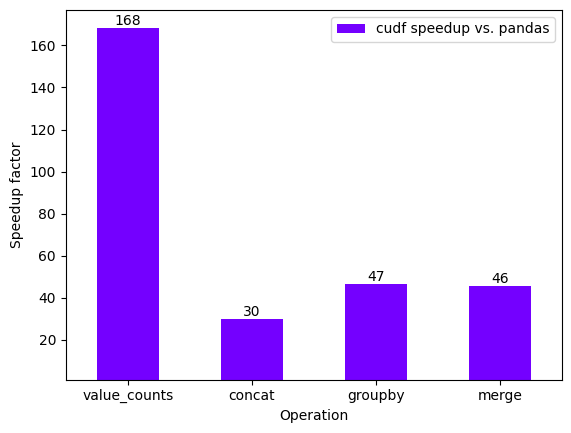
# Cleaning up used memory for later benchmarks
del pdf
del gdf
import gc
_ = gc.collect()
Strings Performance#
timeit_number = 20
num_rows = 300_000_000
pd_series = pd.Series(
np.random.choice(
["123", "56.234", "Walmart", "Costco", "rapids ai"], size=num_rows
)
)
gd_series = cudf.from_pandas(pd_series)
pandas_upper, cudf_upper = timeit_pandas_cudf(
pd_series, gd_series, lambda s: s.str.upper(), number=timeit_number
)
pandas_contains, cudf_contains = timeit_pandas_cudf(
pd_series,
gd_series,
lambda s: s.str.contains(r"[0-9][a-z]"),
number=timeit_number,
)
pandas_isalpha, cudf_isalpha = timeit_pandas_cudf(
pd_series, gd_series, lambda s: s.str.isalpha(), number=timeit_number
)
performance_df = pd.DataFrame(
{
"cudf speedup vs. pandas": [
pandas_upper / cudf_upper,
pandas_contains / cudf_contains,
pandas_isalpha / cudf_isalpha,
],
},
index=["upper", "contains", "isalpha"],
)
performance_df
| cudf speedup vs. pandas | |
|---|---|
| upper | 376.502445 |
| contains | 405.030084 |
| isalpha | 1974.166058 |
performance_plot(performance_df, xlabel="String method")
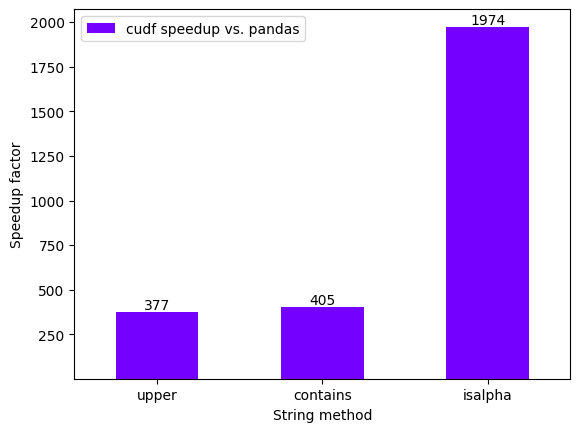
User-defined function (UDF) performance (with JIT overhead)#
The first UDF runs include JIT compilation overhead, due to which the performance of first run and average of next few runs are compared separately.
num_rows = 10_000_000
pdf_age = pd.DataFrame(
{
"age": np.random.randint(0, 100, num_rows),
}
)
pdf_age
| age | |
|---|---|
| 0 | 6 |
| 1 | 28 |
| 2 | 29 |
| 3 | 81 |
| 4 | 69 |
| ... | ... |
| 9999995 | 38 |
| 9999996 | 95 |
| 9999997 | 19 |
| 9999998 | 67 |
| 9999999 | 29 |
10000000 rows × 1 columns
gdf_age = cudf.from_pandas(pdf_age)
gdf_age
| age | |
|---|---|
| 0 | 6 |
| 1 | 28 |
| 2 | 29 |
| 3 | 81 |
| 4 | 69 |
| ... | ... |
| 9999995 | 38 |
| 9999996 | 95 |
| 9999997 | 19 |
| 9999998 | 67 |
| 9999999 | 29 |
10000000 rows × 1 columns
def age_udf(row):
if row["age"] < 18:
return 0
elif 18 <= row["age"] < 20:
return 1
elif 20 <= row["age"] < 30:
return 2
elif 30 <= row["age"] < 40:
return 3
elif 40 <= row["age"] < 50:
return 4
elif 50 <= row["age"] < 60:
return 5
elif 60 <= row["age"] < 70:
return 6
else:
return 7
pandas_int_udf, cudf_int_udf = timeit_pandas_cudf(
pdf_age, gdf_age, lambda df: df.apply(age_udf, axis=1), number=1
)
def str_isupper_udf(row):
if row.isupper():
return 0
else:
return 1
pd_series = pd.Series(
np.random.choice(["ABC", "abc", "hello world", "AI"], size=num_rows),
name="strings",
)
pd_series
0 ABC
1 hello world
2 hello world
3 AI
4 AI
...
9999995 hello world
9999996 abc
9999997 ABC
9999998 ABC
9999999 AI
Name: strings, Length: 10000000, dtype: object
gd_series = cudf.from_pandas(pd_series)
gd_series
0 ABC
1 hello world
2 hello world
3 AI
4 AI
...
9999995 hello world
9999996 abc
9999997 ABC
9999998 ABC
9999999 AI
Name: strings, Length: 10000000, dtype: object
pandas_str_udf, cudf_str_udf = timeit_pandas_cudf(
pd_series, gd_series, lambda s: s.apply(str_isupper_udf), number=1
)
performance_df = pd.DataFrame(
{
"cudf speedup vs. pandas": [
pandas_int_udf / cudf_int_udf,
pandas_str_udf / cudf_str_udf,
]
},
index=["Numeric", "String"],
)
performance_df
| cudf speedup vs. pandas | |
|---|---|
| Numeric | 20.335476 |
| String | 8.280955 |
Below is the plot showing performance speedup in case of Numeric UDFs & String UDFs on their first runs.
performance_plot(performance_df, xlabel="UDF Kind")
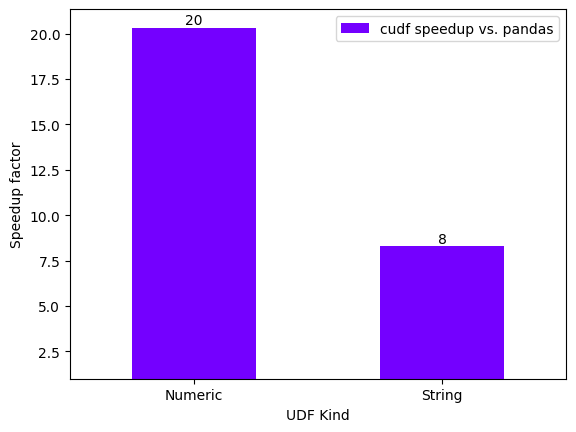
User-defined function (UDF) performance (without JIT overhead)#
timeit_number = 10
pandas_int_udf, cudf_int_udf = timeit_pandas_cudf(
pdf_age,
gdf_age,
lambda df: df.apply(age_udf, axis=1),
number=timeit_number,
)
pandas_str_udf, cudf_str_udf = timeit_pandas_cudf(
pd_series,
gd_series,
lambda s: s.apply(str_isupper_udf),
number=timeit_number,
)
performance_df = pd.DataFrame(
{
"cudf speedup vs. pandas": [
pandas_int_udf / cudf_int_udf,
pandas_str_udf / cudf_str_udf,
]
},
index=["Numeric", "String"],
)
performance_df
| cudf speedup vs. pandas | |
|---|---|
| Numeric | 21377.625003 |
| String | 37.422872 |
Below is the plot showing performance speedup in case of Numeric UDFs & String UDFs on their consequent runs. In this case the speedup is massive because of no JIT overhead present.
performance_plot(performance_df, xlabel="UDF Kind")
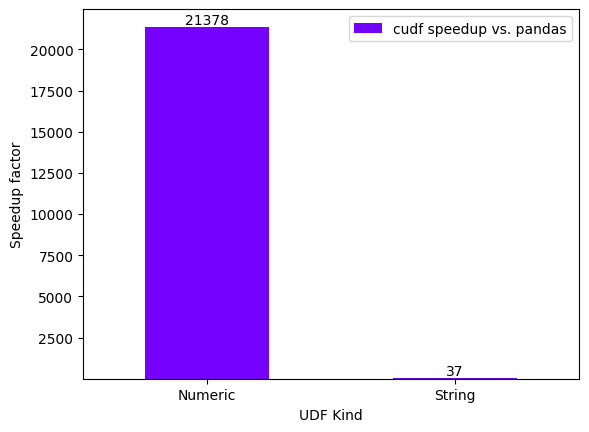
UDF Performance in GroupBy#
num_rows = 100_000_000
timeit_number = 10
pdf = pd.DataFrame()
pdf["key"] = np.random.randint(0, 2, num_rows)
pdf["val"] = np.random.randint(0, 7, num_rows)
def custom_formula_udf(df):
df["out"] = df["key"] * df["val"] - 10
return df
gdf = cudf.from_pandas(pdf)
pandas_udf_groupby, cudf_udf_groupby = timeit_pandas_cudf(
pdf,
gdf,
lambda df: df.groupby(["key"], group_keys=False).apply(custom_formula_udf),
number=timeit_number,
)
/tmp/ipykernel_948063/2864685541.py:4: DeprecationWarning: DataFrameGroupBy.apply operated on the grouping columns. This behavior is deprecated, and in a future version of pandas the grouping columns will be excluded from the operation. Either pass `include_groups=False` to exclude the groupings or explicitly select the grouping columns after groupby to silence this warning.
lambda df: df.groupby(["key"], group_keys=False).apply(custom_formula_udf),
/tmp/ipykernel_948063/2864685541.py:4: DeprecationWarning: DataFrameGroupBy.apply operated on the grouping columns. This behavior is deprecated, and in a future version of pandas the grouping columns will be excluded from the operation. Either pass `include_groups=False` to exclude the groupings or explicitly select the grouping columns after groupby to silence this warning.
lambda df: df.groupby(["key"], group_keys=False).apply(custom_formula_udf),
/tmp/ipykernel_948063/2864685541.py:4: DeprecationWarning: DataFrameGroupBy.apply operated on the grouping columns. This behavior is deprecated, and in a future version of pandas the grouping columns will be excluded from the operation. Either pass `include_groups=False` to exclude the groupings or explicitly select the grouping columns after groupby to silence this warning.
lambda df: df.groupby(["key"], group_keys=False).apply(custom_formula_udf),
/tmp/ipykernel_948063/2864685541.py:4: DeprecationWarning: DataFrameGroupBy.apply operated on the grouping columns. This behavior is deprecated, and in a future version of pandas the grouping columns will be excluded from the operation. Either pass `include_groups=False` to exclude the groupings or explicitly select the grouping columns after groupby to silence this warning.
lambda df: df.groupby(["key"], group_keys=False).apply(custom_formula_udf),
/tmp/ipykernel_948063/2864685541.py:4: DeprecationWarning: DataFrameGroupBy.apply operated on the grouping columns. This behavior is deprecated, and in a future version of pandas the grouping columns will be excluded from the operation. Either pass `include_groups=False` to exclude the groupings or explicitly select the grouping columns after groupby to silence this warning.
lambda df: df.groupby(["key"], group_keys=False).apply(custom_formula_udf),
/tmp/ipykernel_948063/2864685541.py:4: DeprecationWarning: DataFrameGroupBy.apply operated on the grouping columns. This behavior is deprecated, and in a future version of pandas the grouping columns will be excluded from the operation. Either pass `include_groups=False` to exclude the groupings or explicitly select the grouping columns after groupby to silence this warning.
lambda df: df.groupby(["key"], group_keys=False).apply(custom_formula_udf),
/tmp/ipykernel_948063/2864685541.py:4: DeprecationWarning: DataFrameGroupBy.apply operated on the grouping columns. This behavior is deprecated, and in a future version of pandas the grouping columns will be excluded from the operation. Either pass `include_groups=False` to exclude the groupings or explicitly select the grouping columns after groupby to silence this warning.
lambda df: df.groupby(["key"], group_keys=False).apply(custom_formula_udf),
/tmp/ipykernel_948063/2864685541.py:4: DeprecationWarning: DataFrameGroupBy.apply operated on the grouping columns. This behavior is deprecated, and in a future version of pandas the grouping columns will be excluded from the operation. Either pass `include_groups=False` to exclude the groupings or explicitly select the grouping columns after groupby to silence this warning.
lambda df: df.groupby(["key"], group_keys=False).apply(custom_formula_udf),
/tmp/ipykernel_948063/2864685541.py:4: DeprecationWarning: DataFrameGroupBy.apply operated on the grouping columns. This behavior is deprecated, and in a future version of pandas the grouping columns will be excluded from the operation. Either pass `include_groups=False` to exclude the groupings or explicitly select the grouping columns after groupby to silence this warning.
lambda df: df.groupby(["key"], group_keys=False).apply(custom_formula_udf),
/tmp/ipykernel_948063/2864685541.py:4: DeprecationWarning: DataFrameGroupBy.apply operated on the grouping columns. This behavior is deprecated, and in a future version of pandas the grouping columns will be excluded from the operation. Either pass `include_groups=False` to exclude the groupings or explicitly select the grouping columns after groupby to silence this warning.
lambda df: df.groupby(["key"], group_keys=False).apply(custom_formula_udf),
performance_df = pd.DataFrame(
{"cudf speedup vs. pandas": [pandas_udf_groupby / cudf_udf_groupby]},
index=["Grouped UDF"],
)
performance_df
| cudf speedup vs. pandas | |
|---|---|
| Grouped UDF | 88.879055 |
performance_plot(performance_df)
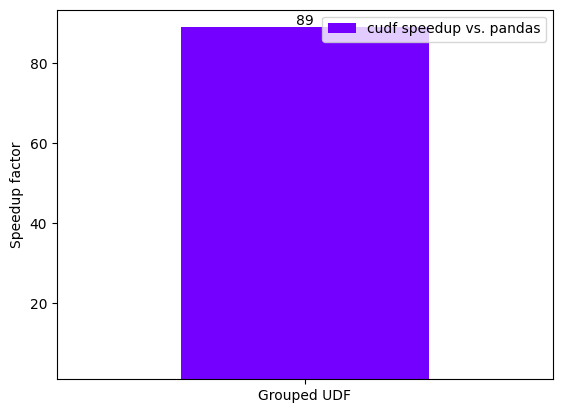
System Configuration#
CPU Configuration#
!lscpu
Architecture: x86_64
CPU op-mode(s): 32-bit, 64-bit
Address sizes: 52 bits physical, 57 bits virtual
Byte Order: Little Endian
CPU(s): 224
On-line CPU(s) list: 0-223
Vendor ID: GenuineIntel
Model name: Intel(R) Xeon(R) Platinum 8480CL
CPU family: 6
Model: 143
Thread(s) per core: 2
Core(s) per socket: 56
Socket(s): 2
Stepping: 7
CPU max MHz: 3800.0000
CPU min MHz: 800.0000
BogoMIPS: 4000.00
Flags: fpu vme de pse tsc msr pae mce cx8 apic sep mtrr pge mca
cmov pat pse36 clflush dts acpi mmx fxsr sse sse2 ss ht
tm pbe syscall nx pdpe1gb rdtscp lm constant_tsc art ar
ch_perfmon pebs bts rep_good nopl xtopology nonstop_tsc
cpuid aperfmperf tsc_known_freq pni pclmulqdq dtes64 mon
itor ds_cpl smx est tm2 ssse3 sdbg fma cx16 xtpr pdcm pc
id dca sse4_1 sse4_2 x2apic movbe popcnt tsc_deadline_ti
mer aes xsave avx f16c rdrand lahf_lm abm 3dnowprefetch
cpuid_fault epb cat_l3 cat_l2 cdp_l3 invpcid_single inte
l_ppin cdp_l2 ssbd mba ibrs ibpb stibp ibrs_enhanced fsg
sbase tsc_adjust bmi1 avx2 smep bmi2 erms invpcid cqm rd
t_a avx512f avx512dq rdseed adx smap avx512ifma clflusho
pt clwb intel_pt avx512cd sha_ni avx512bw avx512vl xsave
opt xsavec xgetbv1 xsaves cqm_llc cqm_occup_llc cqm_mbm_
total cqm_mbm_local split_lock_detect avx_vnni avx512_bf
16 wbnoinvd dtherm ida arat pln pts hwp hwp_act_window h
wp_epp hwp_pkg_req avx512vbmi umip pku ospke waitpkg avx
512_vbmi2 gfni vaes vpclmulqdq avx512_vnni avx512_bitalg
tme avx512_vpopcntdq la57 rdpid bus_lock_detect cldemot
e movdiri movdir64b enqcmd fsrm md_clear serialize tsxld
trk pconfig arch_lbr amx_bf16 avx512_fp16 amx_tile amx_i
nt8 flush_l1d arch_capabilities
Caches (sum of all):
L1d: 5.3 MiB (112 instances)
L1i: 3.5 MiB (112 instances)
L2: 224 MiB (112 instances)
L3: 210 MiB (2 instances)
NUMA:
NUMA node(s): 2
NUMA node0 CPU(s): 0-55,112-167
NUMA node1 CPU(s): 56-111,168-223
Vulnerabilities:
Gather data sampling: Not affected
Itlb multihit: Not affected
L1tf: Not affected
Mds: Not affected
Meltdown: Not affected
Mmio stale data: Not affected
Retbleed: Not affected
Spec rstack overflow: Not affected
Spec store bypass: Mitigation; Speculative Store Bypass disabled via prctl
and seccomp
Spectre v1: Mitigation; usercopy/swapgs barriers and __user pointer
sanitization
Spectre v2: Mitigation; Enhanced IBRS, IBPB conditional, RSB filling
, PBRSB-eIBRS SW sequence
Srbds: Not affected
Tsx async abort: Not affected
GPU Configuration#
!nvidia-smi
Wed Mar 6 12:35:15 2024
+-----------------------------------------------------------------------------+
| NVIDIA-SMI 525.147.05 Driver Version: 525.147.05 CUDA Version: 12.0 |
|-------------------------------+----------------------+----------------------+
| GPU Name Persistence-M| Bus-Id Disp.A | Volatile Uncorr. ECC |
| Fan Temp Perf Pwr:Usage/Cap| Memory-Usage | GPU-Util Compute M. |
| | | MIG M. |
|===============================+======================+======================|
| 0 NVIDIA H100 80G... On | 00000000:1B:00.0 Off | 0 |
| N/A 32C P0 119W / 700W | 44191MiB / 81559MiB | 0% Default |
| | | Disabled |
+-------------------------------+----------------------+----------------------+
| 1 NVIDIA H100 80G... On | 00000000:43:00.0 Off | 0 |
| N/A 31C P0 72W / 700W | 0MiB / 81559MiB | 0% Default |
| | | Disabled |
+-------------------------------+----------------------+----------------------+
| 2 NVIDIA H100 80G... On | 00000000:52:00.0 Off | 0 |
| N/A 34C P0 70W / 700W | 0MiB / 81559MiB | 0% Default |
| | | Disabled |
+-------------------------------+----------------------+----------------------+
| 3 NVIDIA H100 80G... On | 00000000:61:00.0 Off | 0 |
| N/A 34C P0 71W / 700W | 0MiB / 81559MiB | 0% Default |
| | | Disabled |
+-------------------------------+----------------------+----------------------+
| 4 NVIDIA H100 80G... On | 00000000:9D:00.0 Off | 0 |
| N/A 34C P0 121W / 700W | 3473MiB / 81559MiB | 0% Default |
| | | Disabled |
+-------------------------------+----------------------+----------------------+
| 5 NVIDIA H100 80G... On | 00000000:C3:00.0 Off | 0 |
| N/A 30C P0 72W / 700W | 0MiB / 81559MiB | 0% Default |
| | | Disabled |
+-------------------------------+----------------------+----------------------+
| 6 NVIDIA H100 80G... On | 00000000:D1:00.0 Off | 0 |
| N/A 32C P0 73W / 700W | 0MiB / 81559MiB | 0% Default |
| | | Disabled |
+-------------------------------+----------------------+----------------------+
| 7 NVIDIA H100 80G... On | 00000000:DF:00.0 Off | 0 |
| N/A 35C P0 73W / 700W | 0MiB / 81559MiB | 0% Default |
| | | Disabled |
+-------------------------------+----------------------+----------------------+
+-----------------------------------------------------------------------------+
| Processes: |
| GPU GI CI PID Type Process name GPU Memory |
| ID ID Usage |
|=============================================================================|
| 0 N/A N/A 2218749 C ...onserver/bin/tritonserver 22062MiB |
| 0 N/A N/A 2343426 C ...onserver/bin/tritonserver 22122MiB |
| 4 N/A N/A 948063 C ...i/envs/cudfdev/bin/python 3468MiB |
+-----------------------------------------------------------------------------+
